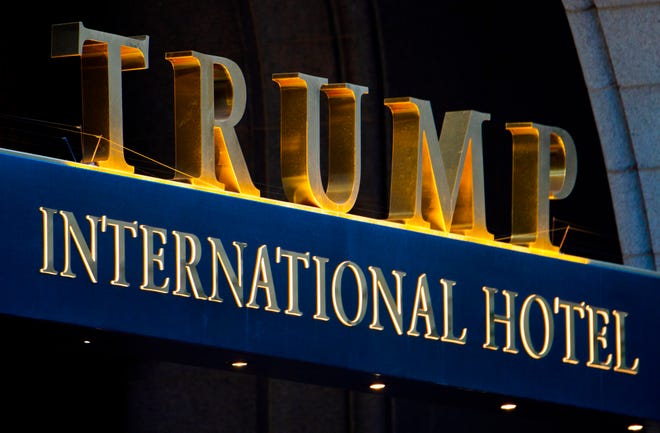WASHINGTON – A federal court on Thursday revived one of three lawsuits challenging the business dealings of President Donald Trump’s luxury Washington, D.C., hotel with foreign and domestic governments.
The full U.S. Court of Appeals for the 4th Circuit reversed a decision by a three-judge panel and restored a lawsuit filed by the District of Columbia and Maryland that contends government payments for hotel stays constitute unconstitutional gifts to the president.
That could set up a showdown at the Supreme Court next year, because a separate federal appeals court in February dismissed a similar lawsuit filed by members of Congress. A third challenge remains pending in New York. And the Department of Justice which represents the president in the 4th Circuit case said it intends to appeal to the nation’s highest court.
All three challenges focus on the Trump Organization’s financial stake in hotels and restaurants, which cater to customers both foreign and domestic with interests before the government Trump heads. The question: Does that violate the Constitution?
Earlier:Trump’s profits from private businesses to get hard look from federal appeals courts
Trump has dismissed the efforts, based on a provision in the Constitution he called “this phony Emoluments Clause.”

But the 4th Circuit appeals court, based in Richmond, Virginia, ruled 9-6 along ideological lines that the separation of powers does not shield the president from complying with the law. Nine judges originally named to the judiciary by Democratic presidents lined up against six Republican presidents’ nominees.
“In the United States, every person – even the president – has a duty to obey the law,” Judge Diana Gribbon Motz wrote for the majority. “The duty to obey these particular laws – the Constitution’s Emoluments Clauses – flows from the president’s status as head of the executive branch.”
Trump’s three nominees to the court signed on to the vehement dissent, written by Judge J. Harvie Wilkinson. Together, two separate dissents totaled 80 pages, compared with the majority opinion’s 25 pages.
“The majority is using a wholly novel and nakedly political cause of action to pave the path for a litigative assault upon this and future presidents and for an ascendant judicial supervisory role over presidential action,” Wilkinson wrote. “The legal foundations for this lawsuit are non-existent. It is a fanciful construct that invites the courts to create rights and duties from thin air.”
Trump’s private business dealings before he won the presidency already are the subject of a Supreme Court case heard on Tuesday and likely to be decided this summer. After losing six times in federal district and appeals courts, Trump’s lawyers seek to block subpoenas from House committees led by Democrats and the Manhattan district attorney for tax returns and financial records.
More:Supreme Court grills both sides in landmark battle over Trump’s financial records
The three emoluments cases are based on the theory that when a foreign, federal or state government official stays at a Trump Organization property, the profits are an unconstitutional gift to the president.
Democratic lawmakers and government watchdogs say the most flagrant violations happen when government officials – including some from Saudi Arabia, Kuwait and Malaysia – spend lavishly at the Trump International Hotel a few blocks from the White House. Trump’s real estate company now is considering selling its lease there.
The Justice Department says a violation must involve Trump profiting directly from his employment as president, not from “the proceeds of ordinary commercial transactions between foreign governments and businesses.”
“As the six dissenting judges noted, this unprecedented suit seeking to enforce the Emoluments Clauses against the President of the United States should have been dismissed, and the court of appeals erred by not even considering the merits of the President’s defenses,” Justice Department spokeswoman Brianna Herlihy said in a statement.
When Trump became president, he turned over day-to-day control of the Trump Organization to his eldest sons, Donald Trump Jr. and Eric Trump. But he did not divest himself from the business, which operates worldwide.
Red flags went up in October when the president offered to host an international economic summit at Trump National Doral, a Florida resort, as well as when Vice President Mike Pence stayed at a Trump resort in Ireland. After a public uproar, Trump announced he wouldn’t hold the summit at his resort after all, but he rejected suggestions it would have run afoul of the Constitution.


